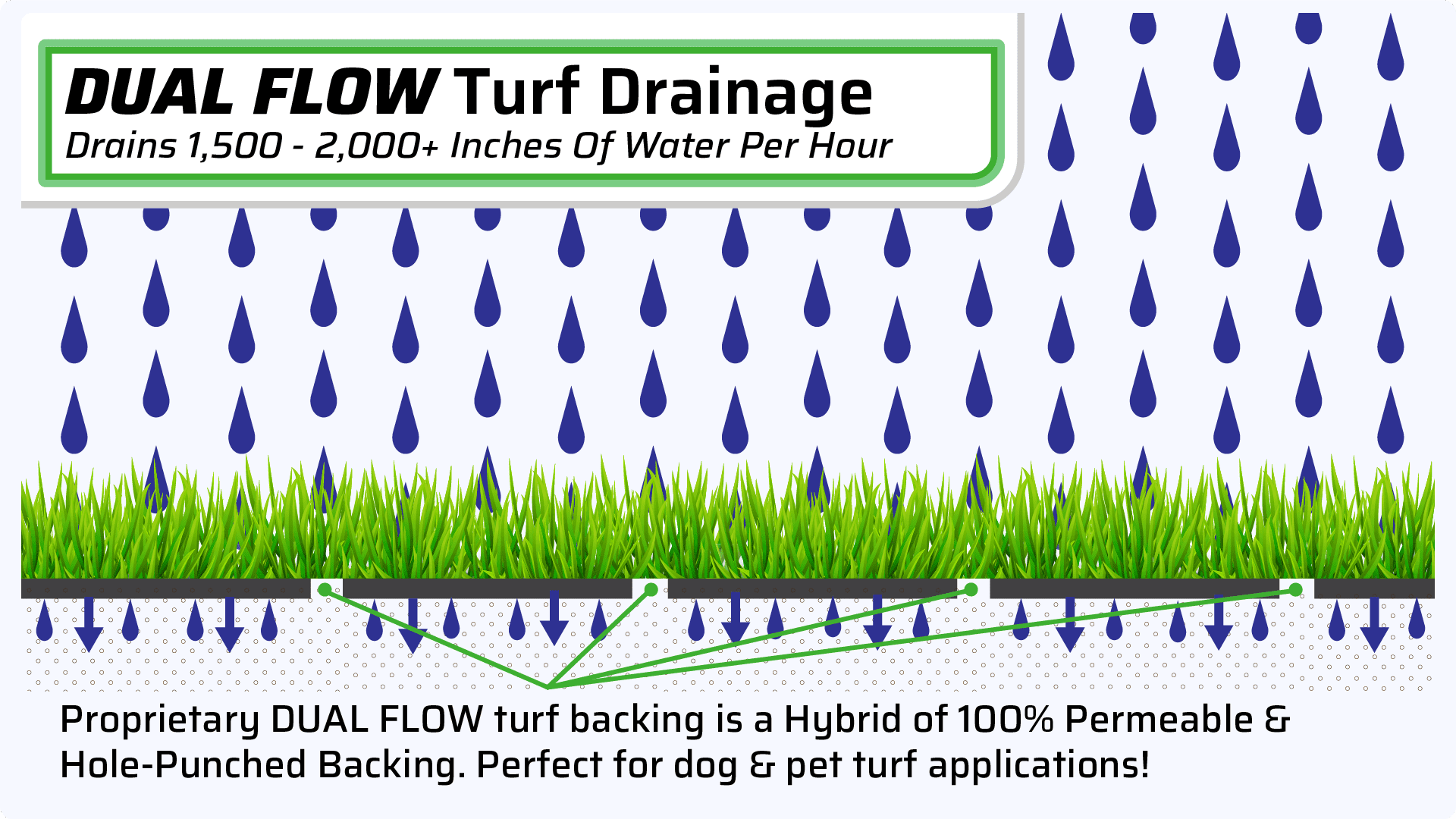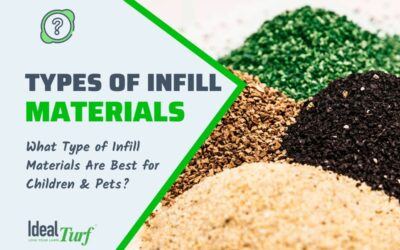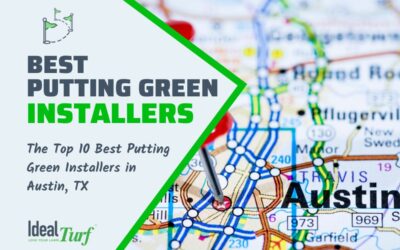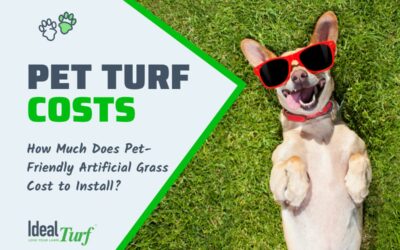The Best Artificial Grass for Dogs & Pets: A Complete Buyer’s Guide

- How To Choose the Best Artificial Grass for Dogs & Pets?
- What to Consider When Choosing the Best Artificial Grass for Dogs
- Our Top Picks of the Best Artificial Grass for Dogs
- Wrapping up the Best Artificial Grass for Dogs Buying Guide
In recent years, the pet turf industry has exploded.
Pet owners are excited at the prospect of having a yard that is easy and inexpensive to maintain.
They’ve realized that pet-friendly artificial grass is resistant to the digging, mud, and dead spots so commonly found in natural grass lawns.
There are so many artificial grass products for dogs out there that it can be hard to choose which one is best for your home.
In this article, we’ll break down the pros and cons of a natural grass lawn versus pet turf.
We’ll also go over the various features offered by different artificial grass products, as well as the advantages and disadvantages of each one.
Armed with this knowledge, you’ll be ready to choose the best artificial grass for dogs to install at your home.

How To Choose the Best Artificial Grass for Dogs & Pets?
When comparing real grass vs. fake grass for dogs and pets, the choice is obvious.
Modern pet-friendly artificial turf products are in a league of their own when compared to ground covers like natural grass, concrete, or gravel.
An added bonus is that pet turf provides homeowners with an eco-friendly alternative to natural grass lawns.
Below, we’ll provide a detailed guide to empower dog owners to evaluate and choose the best fake grass for their dogs.

1. Perform Research
Since artificial grass represents a substantial investment, it’s worth taking the time to research which type will work best for your home, budget, and dog.
Each brand has different levels of quality, drainage, and other features.
As you familiarize yourself with the fake grass varieties available, make a list of which attributes you’d like your lawn to have.

2. Learn Pet Turf Terminology
Having an understanding of pet turf terminology will help you to understand the different components of artificial grass and the advantages of the various features available.
It will also equip you with the knowledge you need to compare brands of pet turf so you can make the most informed decision.
While this list isn’t comprehensive, here are some of the most important terms you’ll come across when shopping for the best artificial grass for dogs.

Yarn
The yarn is the threads or fibers that comprise the artificial grass.
Three main types of material are used to manufacture pet turf:
- Polyethylene
- Polypropylene
- Nylon
Polyethylene is the most common material for artificial grass.
It’s a stellar combination of a soft feel, beautiful look, and hearty durability.
Polypropylene is cheaper than polyethylene or nylon, but it doesn’t stand up to heat as well.
It’s often used for putting greens and as a thatch layer on landscape grasses.
Nylon composes the most expensive and strongest yarn, but it can feel a bit stiff, so it’s typically reserved for use on sporting fields and golfing greens.
The color, thickness, and shape of the yarn can vary to mimic individual species of grass.

Thatch
To make the fake grass look more realistic, many turf products include a layer of thatch — curly, brown threads that create an underlayer of fibers, which mimic the dead grass under the living grass in a natural lawn.
A thatch layer is not strictly necessary, but it is an indicator of a quality turf product.
Thatch creates a springy cushion that is comfortable for dogs and their humans to walk on.

Density
The density of artificial grass refers to the count of blades per square inch.
A greater density signifies a better-quality product.
Densely packed grasses will withstand more traffic and sun exposure than a looser product.
It will also look more realistic, lush, and full.

Pile Height
This refers to the length of the fibers.
Different pile heights are suitable for different purposes.
Turf with a short pile height holds up well to high traffic, as it won’t matt down the way a turf with a taller pile height will.
However, a taller pile height will create a luscious-looking, realistic grass.
In general, a shorter pile height is best for a dog-friendly backyard or pet run areas as it will withstand the heavy use from puppy paws and is easier to clean.

Face Weight
Face weight indicates the weight of the material used to make the artificial grass.
It’s expressed as ounces per square yard.
Durable, good-quality products will have a heavier face weight than others.
It’s important to note that the face weight does not include the weight of the backing.

3. Compare Features of Pet-Friendly Turf Products
While we love the low-maintenance profile of all types of artificial grass, there are products designed specifically with your pets in mind that offer even more convenient elements to ensure the comfort and safety of your animals.
Below, we’ll provide an overview of the features you should look for to find the best artificial grass for dogs.

Turf Backing
Artificial grass has a primary backing and a secondary backing.
The primary backing is composed of a woven polypropylene grid or netting.
Yarn fibers are tufted into the primary backing in rows.
To hold these rows of grass fibers in place, the secondary backing is affixed to the back side of the grid.
Together, the primary and secondary backing comprise the back weight.
To make sure your chosen turf product will withstand any stretching or buckling, make sure it has a back weight of 26 oz. or more.

Pet Turf Drainage
Beyond the weight of the backing, pet-friendly turf needs to allow water and pet urine to pass through the turf.
The only way to clean artificial grass is to pick up the solids and hose off the liquids.
Whether the liquid is rain water or dog urine, it needs to be able to pass through the artificial grass, through the sub-base, and into the soil below.
Without proper drainage, artificial grass can host bacteria, mold, or mildew, which stink up your yard and could be harmful to your pets.
To prevent these problems, turf products are equipped with one of the following types of turf drainage systems.

Hole-Punched Backing
Hole-punched backing or perforated backing is dotted with small holes about 6 inches apart and acts like a colander, allowing liquid to drain out the holes and into the soil.
The average hole-punched backing allows liquid to drain at a rate of 50 inches of water per hour or more.
This works well for dry climates that don’t see lots of precipitation at once.
It’s the least expensive type of backing available.
Because liquid can pool between the holes, hole-punched backing isn’t the ideal choice for dog owners.
Unless you’re hosing down your yard daily, it’s all too easy for urine and its accompanying odors to build up in your artificial grass.

Fully Permeable Backing
If you live in a rainy climate or there are areas in your yard prone to standing water, a 100% permeable or non-perforated backing may be a better choice, as it will drain away water much faster than the hole-punched variety.
It drains at a rate of about 250 inches of water per hour.
This is also a much better choice for pet owners as urine will drain away quicker and more completely than it does in a hole-punched product.

DUAL FLOW Hybrid Turf Backing
The best of both worlds, Ideal Turf’s proprietary, hybrid “DUAL FLOW” backing combines a fully-permeable and a hole-punched backing to allow for maximum drainage efficiency.
It can drain 1,500 – 2,000+ inches of water per hour!
DUAL FLOW backing is another great choice for homeowners with pets, thanks to its top-notch drainage.

Color
Just because you have fake grass doesn’t mean it should look fake!
High-quality turf products often have multiple colors (or “species”) to choose from so you can match your lawn to those in your neighborhood.
This gives the artificial turf a more realistic look.

Infill Material
Many varieties of artificial turf use infill — small granules of sand, cork, rubber, or other materials — in between the grass blades.
Infill plays numerous roles in keeping fake grass beautiful: it keeps the fibers upright, acts as ballast to prevent turf shifting, and makes the turf look and feel more realistic.
While there are many types of infill available on the market, we prefer using cooling infill options in our pet turf installations.
Some infill materials can retain heat and become hot in direct sunlight, which may be uncomfortable or even harmful to pets’ paws.
Cooling infills are designed to reduce surface temperatures—often by 30° to 50°—making them a safer and more comfortable choice for homes with pets.

Antimicrobial
To deter bacteria, mold, and mildew from growing in the synthetic lawn, antimicrobial additives can be included during the turf manufacturing process.
The antimicrobial backing found on Ideal Turf’s artificial grass products called Microbe Safe helps prevent the buildup of odors from pet urine, as well as germs and bacteria.

UV Protection / UV-Stabilized
One of the biggest enemies to artificial grass is sun damage.
Synthetic turf is exposed to the sun everyday, and (in cheaper products) discoloration can occur over time.
However, some artificial grass has built-in resistance to ultraviolet (UV) light.
UV protection keeps artificial grass from fading in the sun.
What’s more, it prevents the backing from breaking down and allowing grass fibers to come out.
By selecting a turf with UV protection, you will prolong the life of your artificial grass lawn.

4. Costs, Budget & Financing
As with any investment, you’ll see the greatest benefits of your artificial grass over time.
The long-term advantages to pet-friendly turf are many:
- Low maintenance
- Increased home value
- Lower water bill
- Improve curb appeal
- No more holes from digging
- No more brown/dead urine spots
- Fewer insects and other pests
The upfront costs of purchasing and installing fake grass exceeds that of seeding or sodding a lawn, so artificial turf is best for people who plan to be in their homes for a few years.
However, when you add up the annual costs in time and money of keeping up a grass lawn (mowing, weeding, fertilizing, aerating, treating for pests, etc.), it’s easy to see why more and more homeowners are choosing synthetic grass for their landscaping.
Ideal Turf also offers several financing options to spread out the initial cost of installing artificial grass.

How Much Does Artificial Grass for Dogs Cost?
The cost of installing pet turf on your lawn depends mostly on the square footage.
To get a good idea of the installation cost, start by measuring your yard’s square footage. This will help you estimate how much you can expect to spend based on the size of the area and the specific materials you choose.
While some customers might get a case of sticker shock from looking at the price, it’s important to remember that the cost savings in water bills, labor, time, yard tools, chemicals and gasoline enable the pet turf to pay for itself in just a few years.
Artificial grass is a long-term investment.

5. Weigh The Pros & Cons of Fake Grass vs. Real Grass for Dogs & Pets
While we love artificial grass for pets as well as general landscaping, it doesn’t work for everyone or in every situation.
In the table below, we’ve broken down some of the pros and cons of fake grass vs. real grass — particularly for dogs and pets.
| Pros | Cons | |
| Natural Grass Lawn | Cheaper to install The “real-grass” feel Lower upfront cost | More expensive to maintain Requires time- and labor-intensive chores Prone to pestsNot weather-resistant Requires harmful chemicals/fertilizers Creates muddy paw prints Pet urine can create dead/brown spots |
| Pet-Friendly Artificial Grass Lawn | Low upkeep Weather-resistant Cheaper to maintain long-term Saves water No harmful chemicals No muddy paw prints No dead spots | Can fade in the sun (without UV protection) Large upfront cost |

What to Consider When Choosing the Best Artificial Grass for Dogs
With so many pet turf options available, how do you choose the best artificial grass for dogs?
Below, we’ve listed the key features you should look for when comparing pet turf products.

1. Foot / Paw Traffic
Whether your lawn is natural or artificial, the number one concern for pet owners is foot traffic.
Especially if you have large dogs and/or kids that play with them, you’ll want to choose a quality product that can withstand the heavy use your family members will dish out.
Look for turf products with a high density and a heavy faceweight for maximum durability.
Make sure you also have adequate infill and an experienced installation team to do the pre-installation work correctly.

2. Resilient & Springy Fibers
One component that will keep your pet turf looking lovely for years is springy and resilient turf fibers.
Good quality fibers will resist laying flat and return to an upright position when you walk across them.
This will prevent parts of your lawn from becoming matted under a pup that wants to sleep in the shade or roll around.
You’ll aid the resilience of your lawn by choosing a quality infill and replenishing the lawn with infill annually.

3. Realistic Aesthetics
Most homeowners want all the benefits of artificial grass, but they don’t want their lawn to look like it’s made of AstroTurf.
To achieve a natural look to your lawn, choose a color that matches the neighboring lawns.
A tall pile height with a good amount of thatch and infill beneath it will make the lawn look lush and full year-round.
If you have dogs, however, you’ll want to balance the pile height with your need for the turf to stand up to foot traffic.
Time, traffic, and gravity will eventually cause some fibers to flatten.
To fix this, use a Power Broom or turf rake to fluff up the fibers a few times per year.
This minimal maintenance will keep your pet turf looking beautiful for years to come.

4. Drains Water & Pet Urine
If you want to be happy with your pet turf, make sure you select a product with adequate drainage.
A quality turf drainage system will prevent unwanted odors, mold, and bacteria from building up in your lawn.
To clean your artificial turf, you’ll need to hose it down periodically.
Bear in mind that the drainage of your pet turf product should accommodate not only your dog’s urine but the water you use to hose it off with as well.

5. Trustworthy & Reliable Pet Turf Installer
If you want to love your artificial lawn, make sure it’s installed right the first time by choosing a reputable and trustworthy artificial grass installation company.
Check out reviews from multiple sources when checking out a turf installer.
Turf installers should be willing to provide you with all the information you want about their turf products and installation process.

Our Top Picks of the Best Artificial Grass for Dogs
There are dozens if not hundreds of pet turf products on the market, which can make choosing the best artificial grass for dogs a daunting task.
The two turf products below are our most popular pet-friendly turf products.

Aberdeen 84 — Our Most Popular Pet-Friendly Turf Product
One of our newest turf products, Aberdeen 84 is equipped with our proprietary “Dual Flow” drainage technology.
An 84-ounce beautiful, lush, and soft natural grass replacement that’s 1.125″ tall featuring delustered and UV stabilized Summer Blend grass blades with Green and Tan thatch that combine to create the perfect artificial grass solution at an affordable price point.
We hope that the incredible performance and value make Aberdeen 84 one of Ideal Turf’s top-selling pet-friendly artificial grass varieties.

Dundee 77 — Versatile Pet-Friendly Turf Product
Our second recommendation for the best artificial grass for dogs is Dundee 77, which also comes with our DUAL FLOW backing and Microbe-Safe™ antimicrobial protection.
It stands at a pile height of 1 inch and uses dark green fibers mixed with tan and light green thatch to make an especially realistic pet turf product.
It’s also manufactured in the USA and is backed by a 20-year warranty.

Wrapping up the Best Artificial Grass for Dogs Buying Guide
Even when you know you want to install artificial grass landscaping for your dog, choosing between the various pet turf products can be intimidating.
However, now that you’re familiar with the terminology and features of synthetic turf, you can shop with confidence.
While online research is certainly a great place to start, it’s especially helpful to talk to the experts on the phone or in-person to answer your individual questions.
If you’re interested in an artificial grass installation in Texas or Oklahoma, please contact Ideal Turf today!
Our team of experts is happy to explain the various products we have to offer, walk you through what to expect with installation, talk about financing options, or just answer whatever questions you have.
Get your FREE artificial grass design & installation estimate by clicking the “GET A QUOTE” button or feel free to give us a call at 800-204-4650.
Author: Tim Taylor
Recent Posts
- How Synthetic Turf Helps Keep Fleas and Ticks Out of Your Texas and Oklahoma Yard
- Porches, Patios & Personality: Creating Outdoor Spaces Texans Love
- Turn Your Backyard into a Golfer’s Dream: Custom Putting Greens by Ideal Turf
- Why Texas Pet Owners Are Choosing Pet-Friendly Artificial Grass from Ideal Turf
- Why More Texans and Oklahomans Are Turning to Artificial Grass for a Greener Future






